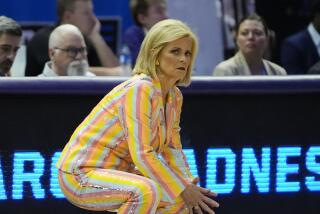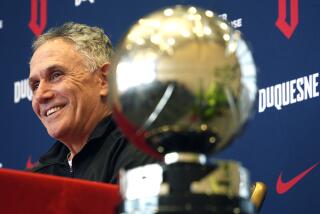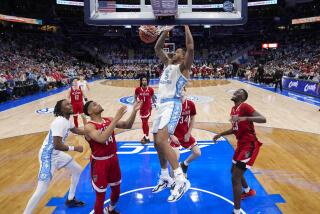COLLEGE BASKETBALL : Best Man Available for All Those Jobs May Be a Woman
Say you are an athletic director at Colorado State, Bradley, Texas A&M;, Tulsa, Virginia Tech, Texas Tech, Jacksonville or UC Irvine--all schools in need of a men’s coach. You have more resumes on your desk than Mike Krzyzewski has consonants and you are still unsure of whom to hire.
Your dilemmas:
--You need to placate your university president, who doesn’t want to see his beloved State U. listed near the bottom of those Chronicle for Higher Education graduation rates. With this in mind, you need a coach absolutely committed to handing out degrees as often as letter sweaters.
--The alumni and boosters want a proven Division I winner, preferably someone with a few NCAA tournament championships to his credit. Since Indiana’s Bobby Knight isn’t available, you have a bit of a problem, don’t you?
--The blue-chip high school players, a fickle bunch at best, rarely know what they want. However, it is best to hire someone familiar with recruiting the nation’s very best prep stars.
Where to find such a person?
May we suggest a Division I coach who has won three NCAA championships, tying Knight’s record among active coaches. This same person has a 442-118 career record and reels in more high school All-Americans than you can shake a clipboard at. As an added bonus, this coach can boast an amazing academic record: A diploma and at least one Final Four appearance for every player who completes four years of eligibility.
May we suggest Pat Summitt, who recently guided Tennessee to its third NCAA women’s championship in 10 seasons.
Of course, there’s only one problem with this idea: She doesn’t want to coach a men’s program.
“Well, I’ve thought about it, but not a lot,” said Summitt, 38. “When (Tennessee was) looking for a (men’s) coach here a couple of years ago, a lot of newspaper people and fans said, ‘Hey, how about Pat Summitt?’
“I think (a woman will coach a men’s team) someday, to be quite honest. But I don’t see me doing that. I think the pressures that would be there, well, it’s not something I’d like to undertake at this point in my life.”
Summitt, who has spent her entire 17-year career at Tennessee, said she never has been approached about coaching a men’s program, not even a courtesy call. And even if she were offered a job, Summitt said she would decline. Her reluctance stems from a desire to promote the women’s game.
“I’m in a position to help women,” said Summitt, who coached the 1984 U.S. women’s team to a gold medal. “We’ve been in an underdog position. It wouldn’t make sense to walk away from it now.”
Good point. Just last weekend, both the women’s semifinal and championship games were seen on network television--a first in the 10-year history of the women’s Final Four. Attendance is up, as is interest and recognition. But Summitt isn’t satisfied, which explains her desire to stay put.
Still, Summitt has watched with interest as Bernadette Locke, a former University of Georgia player, continues her apprenticeship as an assistant on Rick Pitino’s Kentucky staff. Locke, who just completed her first season with the Wildcat men’s program, is the only female to hold such a position in Division I.
“I think that’s the way to do it, whether it’s men’s basketball or women’s basketball,” Summitt said.
As for the question of how well a woman would do as a men’s coach, Summitt could think of only one potential difficulty.
“I think the biggest problem might be in recruiting,” she said. “Obviously not having the experience (as a men’s coach), you don’t go in as a proven winner in men’s basketball. You’d have to be the new kid on the block, and you’d have to sell them on the idea of playing for a woman. I think (recruits) would be skeptical if a female could handle a team and get the job done.”
And now, our postseason awards. . . .
Coach of the year--Roy Williams, Kansas.
Our nominees: Duke’s Krzyzewski, Nevada Las Vegas’ Jerry Tarkanian, Ohio State’s Randy Ayers, Utah’s Rick Majerus, Seton Hall’s P.J. Carlesimo and Williams.
Our reasons: Who did more with less? No contest. Williams led the Jayhawks--who didn’t sneak into the Associated Press top 25 (ranked 24th) until the end of January--to the brink of a national championship. Kansas may have lacked star players, but it didn’t lack a certain blue-collar beauty (we’re getting a little misty eyed, aren’t we?). Anyway, Williams edged Krzyzewski, who had to deal with that Final Four garbage all season, and Majerus, who belongs in the Big Ten, not the WAC.
Player of the year--Larry Johnson, UNLV.
Our nominees: Louisiana State’s Shaquille O’Neal, Providence’s Eric Murdock, Ohio State’s Jimmy Jackson, Oklahoma State’s Byron Houston, Michigan State’s Steve Smith, Temple’s Mark Macon and Johnson.
Our reasons: If Tarkanian could have figured out a way to get Johnson the ball against Duke, Las Vegas, not the Blue Devils, would own the national championship. A power forward forced to essentially play center on offense, Johnson did everything a coach could hope for: score, rebound, pass, play great defense and intimidate. Johnson edged O’Neal and Murdock finished a distant third.
Outlandish rumor of the year--Carlesimo will replace Notre Dame’s Digger Phelps, who is resigning to become U.S. undersecretary of education, or some such nonsense.
Our nominees: Tarkanian will leave UNLV for the Clippers (the NBA, maybe, the Clippers, no); Indiana’s Knight has become as mellow as elevator music (please, stop . . . our sides are killing us); UCLA--the gutty little Bruins (what was that Penn State score again?); David Berst, NCAA assistant executive director for enforcement, telling people, “Drinks are on me,” after UNLV lost to Duke in the tournament semifinal (What he really said was, “Drinks, dinner and valet parking are on me.”)
Before you dismiss the possibility of Nolan Richardson leaving Arkansas for Tulsa (as we did several weeks ago), remember the following: a) Richardson, who made his reputation as coach of the Oklahoma school, is an emotional, dynamic, somewhat impulsive man who likes to have his ego stroked as much as the next guy; b) It isn’t unprecedented for a big-name Arkansas coach to bolt for money, prestige, or both. Football coach Ken Hatfield left the school for Clemson a season ago, and Eddie Sutton couldn’t leave Fayetteville fast enough for the Kentucky job; c) Tulsa boosters reportedly are putting together a financial package that would rival that of any Division I coach; d) Richardson has been stung by criticism that his program lacks discipline, both on and off the court.
Syracuse Coach Jim Boeheim, in town for Wednesday’s Wooden Award ceremony, said that the publicity surrounding an investigation into the school’s basketball program has hurt his ability to recruit.
“The biggest punishment is the period of time it takes to get it done,” he said. “It might take a year and a half. Your recruiting is killed for a year. We lost two kids we had locked up in the fall already. It’s the not knowing that kills you.”
An internal investigation is under way, one which, Boeheim said, will include hundreds of interviews with those connected--past and present--with the Syracuse program. An NCAA investigation should follow.
“It’s a long process,” he said. “Hopefully, we’ll get something accomplished by the end of the summer.”
For those waiting for an explanation as to why Pete Pavia ejected Dean Smith from the semifinal game against Kansas, don’t bother. Despite pleas by the assembled media, most notably, members of the U.S. Basketball Writers Assn., college officials will continue to be protected by the NCAA’s antiquated gag rule.
Pavia, a respected and accomplished referee, assessed Smith with two technical calls during last Saturday’s game. The second foul, with 35 seconds remaining and North Carolina trailing by five points, meant automatic ejection for Smith. It was an important call that deserved a better explanation than the terse statement issued on behalf of, but not by, Pavia.
The USBWA cried foul, arguing that in such a crucial game, a pool reporter should be allowed to get Pavia’s side of the story.
“(The USBWA is) going to have to make a better case than made to date,” said Jim Delany, NCAA tournament selection chairman.
Coaches are available to the media after a game. So are players. Even the NFL and major league baseball allow limited access to its referees and umpires. Why not a college referee in a Final Four game? They’re big boys.
“This talk of accountability doesn’t carry any weight,” he said.
Delany said an official makes numerous calls during a game and can’t be expected to defend each one. He said officials deserve protection from media scrutiny and the NCAA grades each referee, rewarding those who excel and dropping those who falter. The last thing a referee (or more correctly, the NCAA) needs, said Delany, is a postgame news conference.
But Delany misses the point. Fans deserve an accurate explanation of calls such as the one Pavia made. One pool reporter doesn’t constitute a news conference, nor does it necessarily mean a referee will be criticized. In this case, it would have explained why Smith had to take a hike in North Carolina’s most important game of the season.
Our final top 10: 1) Duke, 2) UNLV, 3) Kansas, 4) North Carolina, 5) Seton Hall, 6) Temple, 7) Arkansas, 8) St. John’s, 9) Indiana, 10) Utah.
More to Read
Go beyond the scoreboard
Get the latest on L.A.'s teams in the daily Sports Report newsletter.
You may occasionally receive promotional content from the Los Angeles Times.










